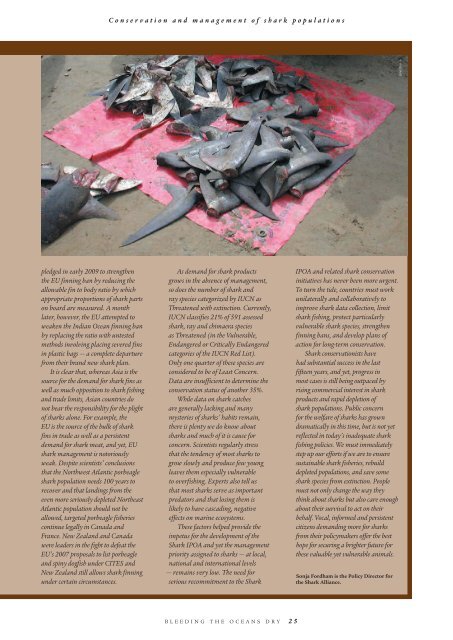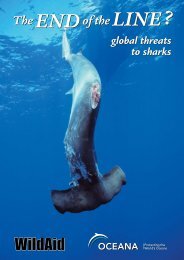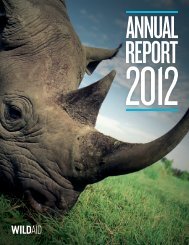Bleeding the Oceans Dry - WildAid
Bleeding the Oceans Dry - WildAid
Bleeding the Oceans Dry - WildAid
- No tags were found...
You also want an ePaper? Increase the reach of your titles
YUMPU automatically turns print PDFs into web optimized ePapers that Google loves.
C o n s e r v a t i o n a n d m a n a g e m e n t o f s h a r k p o p u l a t i o n s© <strong>WildAid</strong>pledged in early 2009 to streng<strong>the</strong>n<strong>the</strong> EU finning ban by reducing <strong>the</strong>allowable fin to body ratio by whichappropriate proportions of shark partson board are measured. A monthlater, however, <strong>the</strong> EU attempted toweaken <strong>the</strong> Indian Ocean finning banby replacing <strong>the</strong> ratio with untestedmethods involving placing severed finsin plastic bags — a complete departurefrom <strong>the</strong>ir brand new shark plan.It is clear that, whereas Asia is <strong>the</strong>source for <strong>the</strong> demand for shark fins aswell as much opposition to shark fishingand trade limits, Asian countries donot bear <strong>the</strong> responsibility for <strong>the</strong> plightof sharks alone. For example, <strong>the</strong>EU is <strong>the</strong> source of <strong>the</strong> bulk of sharkfins in trade as well as a persistentdemand for shark meat, and yet, EUshark management is notoriouslyweak. Despite scientists’ conclusionsthat <strong>the</strong> Northwest Atlantic porbeagleshark population needs 100 years torecover and that landings from <strong>the</strong>even more seriously depleted Nor<strong>the</strong>astAtlantic population should not beallowed, targeted porbeagle fisheriescontinue legally in Canada andFrance. New Zealand and Canadawere leaders in <strong>the</strong> fight to defeat <strong>the</strong>EU’s 2007 proposals to list porbeagleand spiny dogfish under CITES andNew Zealand still allows shark finningunder certain circumstances.As demand for shark productsgrows in <strong>the</strong> absence of management,so does <strong>the</strong> number of shark andray species categorized by IUCN asThreatened with extinction. Currently,IUCN classifies 21% of 591 assessedshark, ray and chimaera speciesas Threatened (in <strong>the</strong> Vulnerable,Endangered or Critically Endangeredcategories of <strong>the</strong> IUCN Red List).Only one quarter of <strong>the</strong>se species areconsidered to be of Least Concern.Data are insufficient to determine <strong>the</strong>conservation status of ano<strong>the</strong>r 35%.While data on shark catchesare generally lacking and manymysteries of sharks’ habits remain,<strong>the</strong>re is plenty we do know aboutsharks and much of it is cause forconcern. Scientists regularly stressthat <strong>the</strong> tendency of most sharks togrow slowly and produce few youngleaves <strong>the</strong>m especially vulnerableto overfishing. Experts also tell usthat most sharks serve as importantpredators and that losing <strong>the</strong>m islikely to have cascading, negativeeffects on marine ecosystems.These factors helped provide <strong>the</strong>impetus for <strong>the</strong> development of <strong>the</strong>Shark IPOA and yet <strong>the</strong> managementpriority assigned to sharks — at local,national and international levels— remains very low. The need forserious recommitment to <strong>the</strong> SharkIPOA and related shark conservationinitiatives has never been more urgent.To turn <strong>the</strong> tide, countries must workunilaterally and collaboratively toimprove shark data collection, limitshark fishing, protect particularlyvulnerable shark species, streng<strong>the</strong>nfinning bans, and develop plans ofaction for long-term conservation.Shark conservationists havehad substantial success in <strong>the</strong> lastfifteen years, and yet, progress inmost cases is still being outpaced byrising commercial interest in sharkproducts and rapid depletion ofshark populations. Public concernfor <strong>the</strong> welfare of sharks has growndramatically in this time, but is not yetreflected in today’s inadequate sharkfishing policies. We must immediatelystep up our efforts if we are to ensuresustainable shark fisheries, rebuilddepleted populations, and save someshark species from extinction. Peoplemust not only change <strong>the</strong> way <strong>the</strong>ythink about sharks but also care enoughabout <strong>the</strong>ir survival to act on <strong>the</strong>irbehalf. Vocal, informed and persistentcitizens demanding more for sharksfrom <strong>the</strong>ir policymakers offer <strong>the</strong> besthope for securing a brighter future for<strong>the</strong>se valuable yet vulnerable animals.Sonja Fordham is <strong>the</strong> Policy Director for<strong>the</strong> Shark Alliance.b l e e d i n g t h e o c e a n s d r y 2 5





